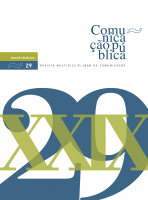Health Literacy and Public Health Risk Communication
DOI:
https://doi.org/10.4000/cp.11303Keywords:
health literacy, risk communication, public health communication, COVID-19 informationAbstract
Health risk communication has been a field of study, but also of practice, fundamental in the field of public health communication. This article takes a critical, albeit non-systematic, approach to public health risk communication and its application in the Portuguese case, namely by public health authorities, during the first four months of the COVID-19 pandemic. Simultaneously, the importance of literacy levels of the Portuguese population for the understanding, the adoption and the use of the information provided in the effectiveness of risk communication in public health is addressed.
Downloads
References
Curtis, V., Dreibelbis, R., Sidibe, M., Cardosi, J., Sara, J., Bonell, C., … Aunger, R. (2020). How to set up government-led national hygiene communication campaigns to combat COVID-19: a strategic blueprint. Preprints.
Espanha, R. (2009). Saúde e comunicação numa sociedade em rede. Lisboa: Monitor.
Espanha, R. & Ávila, P. (2016). Health literacy survey Portugal: A contribution for the knowledge on health and communications. Procedia Computer Science, 100, 1033-1041. https://doi.org/10.1016/j.procs.2016.09.277 DOI : 10.1016/j.procs.2016.09.277
Glik, D. C. (2007). Risk communication for public health emergencies. The Annual Review of Public Health, 28, 33–54. https://doi.org/10.1146/annurev.publhealth.28.02
Kickbusch, I., & Sakellarides, C. (2006). Flu City - Smart City: Applying health promotion principles to a pandemic threat. Health Promotion International, 21(2), 85–87. https://doi.org/10.1093/heapro/dal014
DOI : 10.1093/heapro/dal014
Moscovici, S. (2005). Memória, imaginário e representações sociais, Rio de Janeiro: Museu da República.
Noar, S. M. (2006). A 10-year retrospective of research in health mass media campaigns: Where do we go from here? Journal of Health Communication, 11(1), 21–42. https://doi.org/10.1080/10810730500461059 DOI : 10.1080/10810730500461059
Paakkari, L., & Okan, O. (2020). COVID-19: Health literacy is an underestimated problem. The Lancet. Public Health, 5(5), e249–e250. https://doi.org/10.1016/S2468-2667(20)30086-4
DOI : 10.1016/S2468-2667(20)30086-4
OMS (2018). Comunicação de riscos em emergências de saúde pública - Um guia da OMS para políticas e práticas em comunicação de risco de emergência. Genebra: Organização Mundial da Saúde. Licença: CC BY-NC-SA 3.0 IGO.
Prior, H. (2020). Comunicación pública de riesgo en tiempos de pandemia: Las respuestas de Portugal a la COVID-19. Más Poder Local, 41, 6-11.
Sentell, T., Vamos, S., & Okan, O. (2020). Interdisciplinary perspectives on health literacy research around the world: More important than ever in a time of COVID-19. International Journal of Environmental Research and Public Health, 17(9), 3010. https://doi.org/10.3390/ijerph17093010 DOI : 10.3390/ijerph17093010
Sørensen, K., Pelikan, J. M., Rothlin, F., Ganahl, K., Slonska, Z., Doyle, G., . . . Brand, H. (2015). Health literacy in Europe: Comparative results of the European health literacy survey (HLS-EU). European Journal of Public Health, 25(6), 1053–1058. https://doi.org/10.1093/eurpub/ckv043 DOI : 10.1093/eurpub/ckv043
Van den Broucke, S. (2020). Why health promotion matters to the COVID-19 pandemic, and vice versa (Editorial). Health Promotion International, 35(2), 181–186. https://doi.org/10.1093/heapro/daaa042.
DOI : 10.1093/heapro/daaa042
Zhang, L., Li, H., & Chen, K. (2020), Effective risk communication for public health emergency: Reflection on the COVID-19 (2019-nCoV) outbreak in Wuhan, China. Healthcare, 8(1), 64. doi:10.3390/healthcare8010064
DOI : 10.3390/healthcare8010064
Downloads
Published
Issue
Section
License
Copyright (c) 2020 Direitos de Autor (c) 2020

This work is licensed under a Creative Commons Attribution-NonCommercial 4.0 International License.
Os conteúdos da Comunicação Pública estão licenciados com uma licença Creative Commons - Atribuição-NãoComercial 4.0 Internacional.


